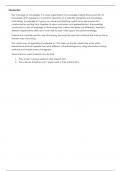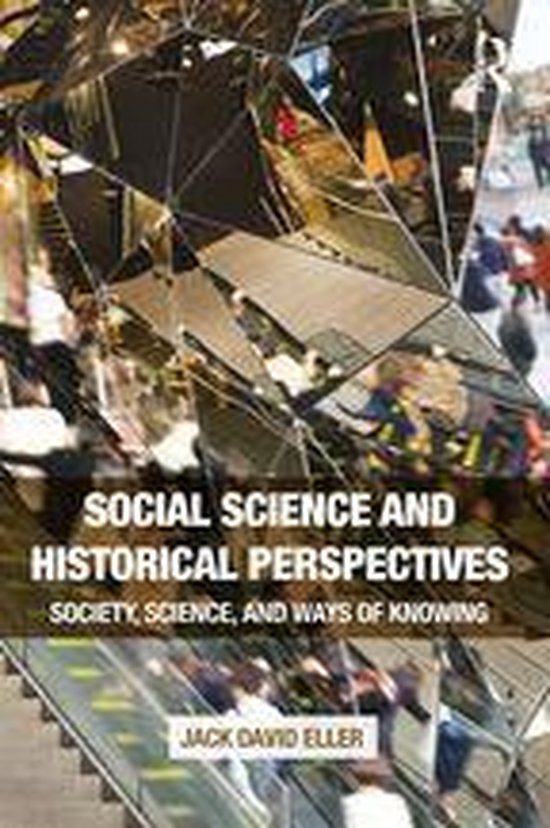Introduction
The ‘sociology of knowledge’ is a social organization of knowledge-making (the production of
knowledge often happens in a research laboratory of a scientific discipline) and knowledge-
transmitting. Knowledge isn’t grown on a tree and therefore, needs to be discovered and
constructed by putting facts together to draw conclusions and generalizations. A knowledge
community Is a sort of language of terminology that various disciplines use differently, therefore
different departments often don’t even talk to each other about the same knowledge.
Science is a culturally-specific way of knowing, because the one that contends the science has a
Western way of knowing
The current way of organizing knowledge isn’t the best; we should collaborate more within
departments and with people that have different cultural background, using information-sharing
methods and maybe even photography
Social sciences were invented very recently
1. They haven’t always existed in their present form
2. The sciences therefore won’t always exist in their present form
,1 What is social science?
Process of conducting/discovering knowledge
1. Creation
2. Perpetuation
3. Transmission
4. Institutionalization
Karl Mannheim: first to suggest a social approach to knowledge (about our society), including the
question: how do the social location of individuals and group shape their knowledge? He found
that taste reflects the society and a person’s location in society (gender, class, age…). He studied
the relation between:
- Knowledge-age result: shared thought, experience, feeling and action, thus a
stratification of experience
- Knowledge-generation result: people who occupy the same generation share a
common location in the social and historical process, thus the same experience
Swindler and Arditi were interested in various types of knowledge and the question: how social
organization make orderings of knowledge possible?
Basil Bernstein studied social processes of educational knowledge, suggesting three common
message systems within the school institution
1. Curriculum (aka contents/canon): some people select things that are worth knowing and
appropriate for the level of the knower choices must be made about which events to
include and exclude and how the emphasize/interpret them
2. Pedagogy (teaching methods): any academic institution must decide how to teach, which
comes with decisions: memorization/critical thinking, textual/visual materials, group work/
individual work
3. Evaluation (testing): can be done by parents, but also by administrators for example
Bernstein identified two dimensions of the organization of knowledge
1. Classification: about the boundaries between subject areas in the curriculum (math is
different from history from art)
2. Frame: referring to teaching practices as the degree of control, order and timing of
activities
Expert knowledge is created by practices and experience through facts or evidence, identified on
the basis of qualifications, training, experience, professional membership and peer recognition. It’s
limited to a specific subject area and it’s source of knowledge is education, depended of schools,
teachers and textbooks. Experts often work in groups and possess power for their information,
coming from scientific discoveries and technological breakthroughs.
Educational and expert knowledge together raise issues of power (knowledge is power), where it is
also shaped by punishment and physical constraint
Foucault: the knowledge/power system in any society is a discursive regime or an episteme
(Greek), where people only know what there is to know or think (no creativity, so huge limits).
Some scientists say that knowledge is less a matter of cognitive or verbal information, but more of
practical skills and learned intuitions (experience) enskilment = learned by observation, not by
teaching
,Habit = acquired, but unconscious embodied knowledge that makes social action possible
Agnotology = the investigation of the causes and effects of ignorance or knowledgelessness (not
having the information, sometime due to secrets, silence or active suppression of knowledge)
Some claims of knowledge contradict, threaten or undermine knowledge, belief or interests: just as
when you tell a tobacco company that smoking is bad
Agnomancy = ignorance, accusations of conspiracy, selective picking of evidence, censorship,
encouraging or insisting doubt ignorance, however, has two subtypes:
1. Error: distortion (confusion and inaccuracy) + incompletedness (absence and uncertainty)
2. Irrelevance: claims that are off-topic, undecidable, taboo
Three widely held assumptions about knowledge:
1. Scientific knowledge progresses each day: science has more and better knowledge than
the day before
2. Scientific knowledge is superior to other forms of knowledge because of its method
3. Scientists are conscious of the upper
Positivism = science is a matter of getting more and better facts knowledge equals facts
Scientific discovery is not a straightforward asocial process, but a social and collective activity,
where people of a thought-collective share ideas and intellectual interaction. A scientific thought
style consists of a mood and its performance, created by
Thought style = the readiness for directed perception, with corresponding mental and objective
assimilation of what has been so perceived – characterized by common features in the problems
of interest to a thought collective, by the judgement which the thought-collective thinks is evident
Kuhn: scientific ‘progress’ is actually a series of revolutions or changes of fundamental worldviews +
a scientific revolution of scientific worldview is a paradigm (= context of ideas that makes a theory
possible and sensible). Scientists work within their established paradigm, because every
department speaks a different scientific language. Doing normal science means solving the
problem that the paradigm poses. Paradigms shift often only when some young scientist joins the
group and re-envisions the old one, where the old theory will disappear to a considerable extent
and then for all.
Knorr-Cetina: introduced the term epistemic culture, which refers to arrangements and
mechanisms, bonded through affinity, necessity and historical coincidence, which makes up how
we know what we know each discipline has their own. Science is a linear process and it also
doesn’t necessarily have to work with experiments and laboratories. Knowledge is however only
scientific when it has potential to be tested and falsified.
In ancient Greek, philosophy was the first study that speculated about society and social
organization, seeking wisdom beyond traditional views. Modern social sciences (sociology,
anthropology, political science and economics) didn’t emerge until pretty recently, while they all
come from the old philosophy.
Natural sciences have better reputation than social sciences due to the magnificent results those
studies have given (factories, cars, computers). Because almost all attention went to natural
sciences, social sciences failed to develop. Theology was more important during the Middle Ages
and back then, the word science wasn’t immediately applied, because it was first called natural
philosophy of natural history.
, Science in the modern era is characterized by the concepts that make us able to predict and
control future events:
- Law: science discovers facts, but facts are part of much more law of nature a law in
science is a description, ideally in mathematic form that describes the relation between
phenomena
- Causes refer to the necessary relationship between two variables or events most basic
relationship: if A, then B.
Émile Durkheim: a social fact emphasizes its independence from biology or psychology and its
external pressure on individuals within a society
Max Weber: humans act in order to attain some future condition, not because of a prior condition.
It isn’t possible to explain human behaviour through a formula, because:
1. Each has his/her own perspectives, meanings and reasons, so two people within the same
circumstances may not behave the same
2. The social world is far more complex than the physical world, because each individual has
his/her own rules, roles, groups and institutions in which they live and act
3. Most human action is not replicable, so generalization is almost impossible
A rule is a meaningful guide for action and therefore a commitment to act in a certain way, based
on prior knowledge. in English grammar, there are certain rules that you have to follow, which
doesn’t even come with questions, you just need to follow them. However, people can have a own
literary style – social rules account for regularity. Habitus is learned skills and dispositions, like
grammar, which operates as a structure through our knowledge, skills and dispositions, but however
never determines future action.
For centuries, social sciences tried to separate themselves from previous undertakings:
- Pythagoras had an own school that examined number and mathemetics, aka philosophy
speculating the natural world
- Socrates and Plato were active in the field of political and social search (Socrates was a
teacher, Plato opened a teacher institution – the Academy, which lasted 1000 years till the
Roman Empire shut it down)
- Aristotle wrote papers on politics, ethics, poetics, metaphysics and nature
o When Plato’s school closed, two learning channels originated: Aristotle’s teachings
and Christian theology (from the Christian-Roman era, where scholars looked for
proof of God’s existence, speculations on God’s nature, expositions of Christian
belief and interpretation of Christian literature)
The first university opened in 1088 in Bologna, where law, medicine and theology were taught.
During the Renaissance, liberal arts were added to the university curriculum, which are free from
Church authority, free from specific professional careers and intended to generate free minds.
Liberal arts consist of:
- Trivium (3 verbal arts): grammar, dialectics and rhetoric (persuasion and public speaking)
- Quadrivium (4 technical subjects): arithmetic, astronomy, geometry and music
Now, different social sciences have grown out of each other:
- Political economy = political science + economics
- Medicine = psychology + neurology + clinical treatment of mental illness
- Sociology = philosophy + psychology
- Anthropology = history






